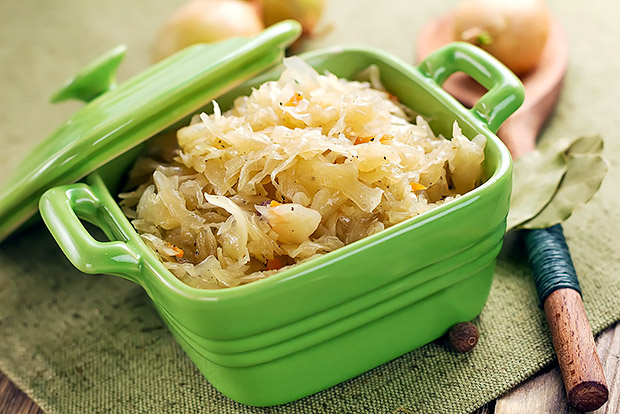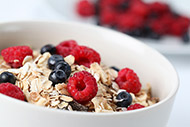
Research shows that healthy bacteria in our bodies improve digestion and immunity. We can boost these healthy bacteria by eating foods that contain probiotics, like those found in fermented foods.
How are fermented foods made?
When a food is fermented, bacteria feed off of the natural sugars. This produces compounds that help preserve the food, and the food becomes filled with healthy bacteria and enzymes.
How do fermented foods improve health?
Healthy bacteria and enzymes help break down food. Simply put, they kickstart digestion before the food is eaten, making it easier for the body to digest once it reaches the stomach. Digestive health is linked to inflammation, allergies, and autoimmune disorders, which all play a role in illness. Because fermented foods improve gut health, they may also help boost the immune system to protect against illness and help fight cancer. For example, fermented cabbage has been shown to increase levels of cancer-fighting glucosinolates.
What are some examples of fermented foods?
Tempeh - made from fermented soybeans
Sauerkraut - made by fermenting cabbage
Kefir - made from fermented milk
Kombucha - a fermented tea drink
Yogurt - made by introducing beneficial bacteria to milk
Kimchi - made with fermented cabbage and Korean spices
Are all fermented foods healthy?
While the bacteria and enzymes in fermented foods are beneficial, unhealthy additives and flavorings can diminish their health advantages. For instance, some fermented foods may contain high levels of sodium, added sugars, or artificial fruit flavors. The pasteurization process used to extend the shelf life of some fermented foods can also destroy the beneficial bacteria. To maximize the nutritional benefits, opt for freshly fermented foods with minimal added sugars and sodium, or consider preparing your own to manage the additives.



 3 Healthy Lunches for Your Work Week
3 Healthy Lunches for Your Work Week
 5 Tips for Stretching Your Budget for Healthy Food
5 Tips for Stretching Your Budget for Healthy Food
 Best Ways to Reduce Added Sugar
Best Ways to Reduce Added Sugar
 Healthy Tips to Lighten Up Picnic Foods
Healthy Tips to Lighten Up Picnic Foods
 Do You Need to Drink Milk?
Do You Need to Drink Milk?
 Tips to Keep Track of Water Intake
Tips to Keep Track of Water Intake
 What Is a Paleo Diet?
What Is a Paleo Diet?
 Eating to Build Muscle
Eating to Build Muscle

 Pinterest
Pinterest RSS Feed
RSS Feed